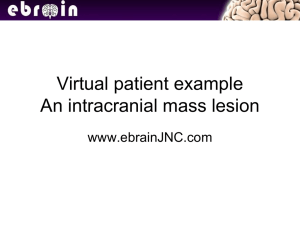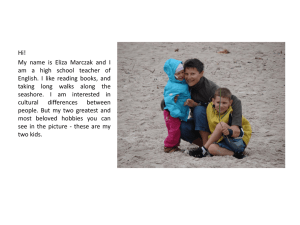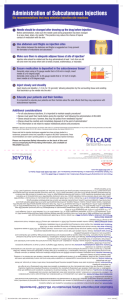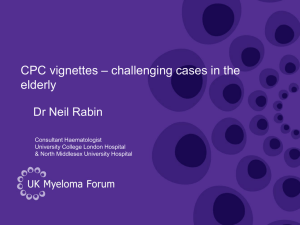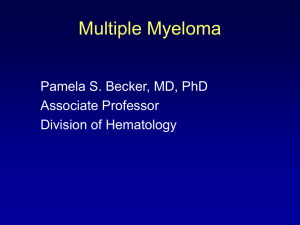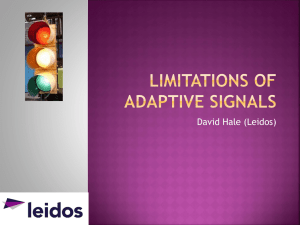Multiple Myeloma Case studies — Kwee Yong
advertisement
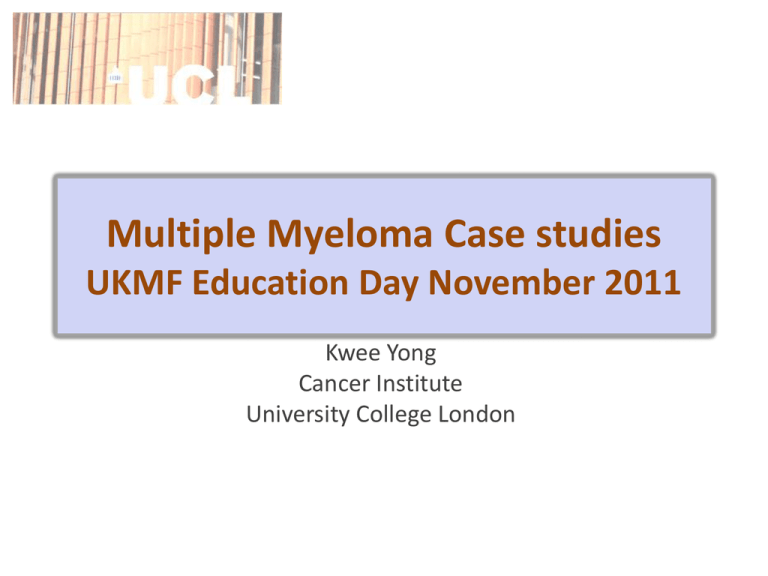
Multiple Myeloma Case studies UKMF Education Day November 2011 Kwee Yong Cancer Institute University College London Case 1 : Lynne • • • • • • • • • 36 year old business manager June 2010: fatigue & nosebleeds Hb 8.8g/dL, WBC 2.8 x 109/L, Neuts 0.9, plts 198 IgG 79g/L, pp = 61 Creatinine 109umol/L, normal Ca++ Albumin 33g/L, b2m 3.7mg/L (ISS Stage 2) BMT: 80% plasma cells, CD56+, cyclin D1+ FISH: t(11;14) SS: no lytic lesions, MRI spine: no focal lesions Case 1: Lynne Several karytopic abnormalities Case 1: Lynne • July 2010: CTD & zometa (sibling match) – Neutropenia after one dose Cyclo – Thal/Dex – Poor tolerance: dizziness, bradycardia (45-50/min) – Pp 46, then 53 What would you do now? Case 1: Decision point 1 1. Continue with Dexamethasone alone 2. Switch to Velcade and Dexamethasone 3. Continue with Cyclophosphamide and dexamethasone with growth factor support 4. Stop treatment to allow bone marrow recovery Case 1: Lynne • July 2010: CTD & zometa (sibling match) – Neutropenia after one dose Cyclo – Thal/Dex – Poor tolerance: dizziness, bradycardia (45-50/min) – Pp 46, then 53 August 2010: Velcade/Dex 3 cycles Stable disease Grade 1 PN What would you do now? Case 1: Decision point 2 1. Continue with Velcade and Dexamethasone for further 2-3 cycles as tolerated 2. Switch to Revlimid and Dexamethasone 3. Add Revlimid to Velcade and Dexamethasone 4. Arrange mobilisation and PBSCH Case 1 : Lynne • Revlimid 10mg od days 1-14, with velcade 1.3g/m2 and dex • After 14 days, neutrophils 0.6 • Prolonged neutropenia • Transfusions What would you do now? Case 1: Decision point 3 1. Wait for bone marrow recovery and try again with RVD 2. Switch to Revlimid and Dexamethasone 3. ESHAP with PBSCH 4. Proceed to allogeneic transplant Case 1: Lynne What would you do now? Case 1: Decision point 4 1. 2. 3. 4. Salvage regimen prior to ASCT Proceed to allogeneic transplant Proceed to ASCT Clinical trial of new agent Case 1: Lynne ASCT • • • • • Jan 2011 (27 weeks after diagnosis): pp 42 ASCT 14.01.2011 5 week admission Fever day -1 Grade 3/4 mucositis: diarrhoea++, nausea, dehydrated • Hypokalaemia induced DI: polyuria, polydipsia • Neut engraftment day +12 • Discharged day +33 Case 1: Lynne BM 3% PC VGPR What would you do now? Case 1: Decision point 5 1. Nothing 2. Reduced intensity sibling allograft (LenaRIC study) 3. Maintenance with lenalidomide 4. Maintenance with thalidomide Case 1: issues • Primary refractory MM • Discordance in prognostic information between FISH and karyotype • Sibling match – when to allograft? • Case for tandem sib RIC allo? • Poor tolerance of chemotherapy • Toxicity of conditioning Case 2: Joanna • 49 year old charity worker • June 2010 – ‘blocked ear’ for 2 mo – Sudden onset diplopia and numbness R face 4 days • Right 6th nerve palsy • MRI head: large irregular tumour arising from clivus and R sphenoid, invading cavernous sinus • CT scan: rib lesions, T5 lesion invading canal, large sacral mass, sternal mass, L iliac lesion, breast lump Case 2: Joanna R L Case 2: Joanna Case 2: Joanna • • • • • • • Immune paresis Urine protein: 2g/24 hr SFLC: kappa 4720mg/L BMT: 80% plasma cells, cyclin D1+, CD56FISH: IgH split, 17p loss in all cells CT-PET: FDG avid lesions manubrium, R iliac bone, R base of skull, T5 Case 2 : Decision point 1 How would you manage this patient? 1. Urgent DXT to base of skull 2. Treat with CTD 3. Use high grade NHL protocol with CNS treatment 4. Velcade and dexamethasone Case 2: 1: Joanna Case 2: Joanna • • • • LP: no cells, methotrexate High dose dexamethasone Velcade, Idarubicin & Ara-C (June 2010) Clinical response, MRI improvement, KLC 79mg/L • July 2010: Ida-Ara-C no.2 with Velcade/dex – Neutropenic fever, klebsiella septicaemia – Hypoxia, severe mucositis Case 2: Joanna • Velcade / dexamethasone no.3 • Re-staging MRI: good response to treatment • PET-CT scan: new FDG-avid lesions in liver and spleen, previous lesions resolved • BM: CR, KLC 1.7mg/L, urine: IF neg for BJP Case 2: Joanna • • • • • • Biopsy liver lesions x 3!! Fibrosis with inflammatory cells Rx: posaconazole 3 mo Velcade / Dexamethasone no.4 Cyclo-G-CSF prime and PBSC harvest Repeat CT scan: lesions unchanged What would you do now? Case 2: Decision point 2 • Assume liver lesions disease and treat with Revlimid and dexamethasone • Attempt further biopsy of liver • Continue posaconazole and re-scan • Proceed with ASCT Case 2: Joanna Case 2: Joanna • 25 Feb 2011: Melphalan 140 / TBI – 12 Gy in 6 fractions • ASCT in ambulatory care • Fever day +8, resistant E Coli, PICC line out • Engrafted day +12, discharged day +15 • May 2011: BM clear, SFLC normal, – CT abdo: lesions smaller – MRI head Case 2: repeat imaging What would you do now? Case 2: Joanna Case 2: Decision point 3 1. 2. 3. 4. Consolidation DXT to base of skull Do nothing Maintenance with thalidomide (lenalidomide) Search for donor (MUD RIC-allo, -LenaRIC?) 30 Gy DXT to base of skull in 15 fractions Watch and wait Case 3: Lenny Case 3: Lenny • 45 yr old warehouse supervisor • Aug 2011: Back pain since Dec 2010 – Anorexia and weight loss – Unsteady walking – “Numb balls” – Sluggish bowels, urinary hesitancy – Pain radiating down legs, walking with sticks Case 3: Lenny Case 3: Lenny MRI: extensive paravertebral mass T11-L2, extending into soft tissues, and into the spinal canal at L1 compressing the conus Biopsy at Stanmore: Plasma cell tumour Case 3: Lenny Case 3: Lenny • • • • • • Dexamethasone 4mg qds BM clear FBC normal, renal function normal SEP small IgAk pp, total IgA 9.8g/L SFLC SS, MRI spine: no other lesions Solitary plasmacytoma Case 3: Decision point 1 How would you manage this patient? Case 3: Lenny • • • • Surgery and decompression Radiotherapy Treat with CTD Treat with velcade and dexamethasone Case 3: Lenny Case 3: Lenny • Velcade, cyclophosphamide & dexamethasone started within 24 hours • Radiotherapy review – on hold • Pain decreased, improved mobility • Postural drop beginning of cycle 2 – Lying 130/75, standing 107/70 – asymptomatic • Delay 1 week Case 3: Lenny • MRI after 2 cycles CVD, marked improvement • Sensation in groins now normal, perineal parasthesiae persists but better • Bowels : grade 1 constipation • Bladder function normal • IgA reduced from 9.8 to 1.7g/L What would you do now? Case 3: Lenny Case 3: Decision point 2 • • • • Stop CVD and give radical DXT Continue with CVD Switch to CTD Surgery to stabilise spine Spinal plasmacytoma: Radiotherapy, surgical decompression/fixation or systemic treatment? • Level of tumour – Cervical, thoracic, T-L jn, lumbo-sacral • • • • • Spinal cord issues: bony or tumour Spinal stability: (bracing?) Presence of disease elsewhere Stage of disease (diagnosis, relapse) Access (clinical oncologists, surgical colleagues) Solitary bone plasmacytoma • Most (>70%) progress to MM, majority within 2-4 years • Risk of progression assoc with persistence of M-band, abnormal SFLC ratio • PET-CT scanning may be useful to identify occult disease • Relatively indolent disease even after progression, OS 5-10 years Case 4: Michael • 55 yr old schoolteacher • March 2010: back pain (previous L4/5 vertebrectomy) • Hb 6.6g/dl, WBC 2.4, neuts 1.2, Plats 34 • SEP: pp 2 g/L, UTP 9 g/L • b2microglobulin 9.3mg/L • SFLC lambda 5270mg/L • Calcium and Renal function normal Case 4: Michael • BM 90% cyclin D1+ PC, FISH ? Partial p53 loss • MRI: diffuse abn BM signal, extraosseus tumour left 6th rib, paravertebral mass at T11/12 • No spinal cord issues, neurologically intact Case 4: Decision point 1 How would you treat this patient? 1. CTD 2. Velcade and dexamethasone 3. Urgent radiotherapy to paravertebral mass 4. VAD/Idarubicin & Dex (Myeloma XI, PADIMAC) Case 4: Michael BM FISH: t(11;14) single fusion TP53: deleted in 88% What would you do now? Case 4: Decision point 2 1. Add Cyclophosphamide to Revlimid /Dex 2. Proceed with mobilising stem cells 3. ESHAP-type regimen 4. Palliate Case 4: Michael What would you do now? Case 4: Decision point 3 1. 2. 3. 4. Do nothing Search for donor for RIC allo Maintenance with thalidomide Consolidation - ? VTD consolidation Summary of novel agent induction trials (randomized studies) ≥ VGPR rates post-induction and post-transplant Post-induction Post-transplant 79% 71% 57% 44-50% 45-55% 49% * 1516% 3035% VAD TD 42% 62% 33% 45% VD RDnot available TAD *Post-transplant data PAD 39% Harousseau et al. ASH/ASCO symposium during ASH 2008 Rajkumar et al. ASCO 2008 (Abstract 8504); ASH/ASCO symposium during ASH 2008 VTD Lokhorst et al. Haematologica 2008;93:124–7 Sonneveld et al. ASH 2008 (abstract 653); IMW (abstract 152) Cavo et al. ASH 2008 (abstract 158); IMW 2009 (abstract 451) 17p- disease in MM • 9-10% at presentation • Progression event • Associated with Light chain only disease, high ISS stage • Prognostic only if in ≥50% plasma cells • Very poor outlook • IFM study of Vel/Dex, EFS 14 mo vs 36mo (A) Event-free survival (EFS) and (B) overall survival (OS) in patients with del(17p) (n = 54) or without del(17p) (n = 453) treated with bortezomib-dexamethasone induction (EFS and OS in years; P < .001 for EFS and OS). ©2010 by American Society of Clinical Oncology Avet-Loiseau H et al. JCO 2010;28:4630-4634 Case 5: John • • • • • • 63 year old aircraft engineer Presented with anaemia Diagnosed with IgGk MM Initial treatment with VAMP, minor response CDT x 5 ASCT Case 5: John ? Case 5: Decision point 1 1. Palliate 2. Cyclophosphamide and dexamethasone 3. Thalidomide regimen 4. Re-treat with velcade on NHS Case 5: John Case 5: Decision point 2 • • • • Palliate Thalidomide Cyclophosphamide and dexamethasone Clinical trial Clinical trials for relapsed MM • Bortezomib trials (± HDACi, ±hsp90i, ±mAb) – Usually IV velcade – 1-3 prior lines • Lenalidomide trials (±carfilzomib, ±CS1 mAb) • Pomalidomide trials • MUK Clinical Trials Network early phase studies – Less restriction in no of prior lines

